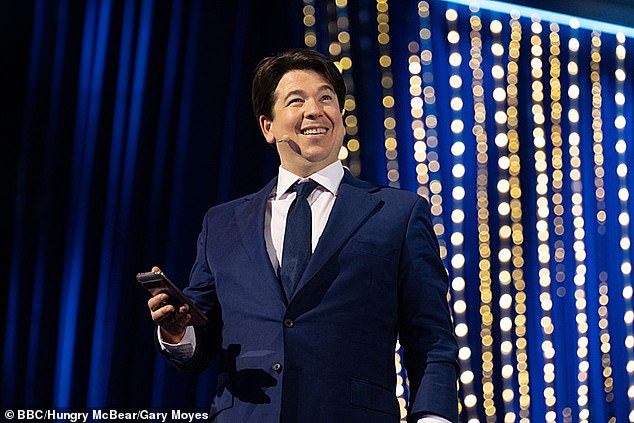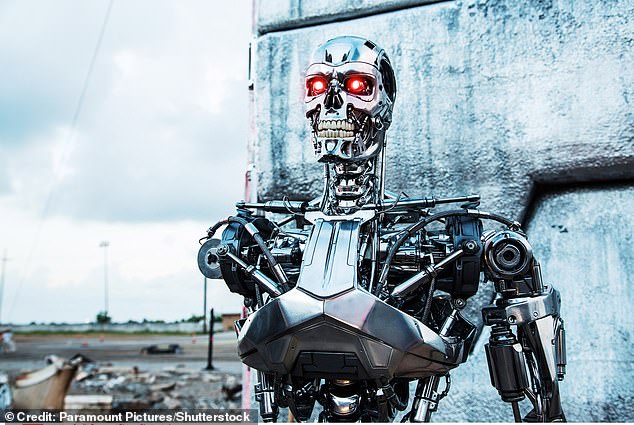Comedians, watch out! AI is FUNNIER than humans, study claims – so can you tell which of these jokes was written by a robot?
Telling a well-crafted joke that hits just right may seem like a quintessentially human approach.
But there’s bad news for comedians: researchers at the University of Southern California say AI is now funnier than most humans.
Their research found that ChatGPT could come up with jokes that were rated funnier than human jokes 70 percent of the time.
And that’s no laughing matter, as the researchers warn that joke-writing robots could pose a “serious threat to employment” for professional comedians.
Do you know which of these jokes were written by a robot?
Delivering a catchy joke like stand-up comedian Jimmy Carr (pictured performing at the NY Comedy Festival) is no longer a skill exclusive to humans
Until now, it was widely believed that AIs would not be able to create humor on a human level.
To test this theory, researchers pitted humans and AI against each other in two comical challenges.
The first task asked 105 people to provide their funniest answers to a series of tasks.
Participants were asked to come up with funny sentences for the abbreviations ‘STD’, ‘CLAP’ and ‘COW’
They were then asked to complete a Mock the Week-style assignment, responding to questions such as: “One notable achievement that you would probably not list on your resume: ________.”
Finally, people were asked to create a ‘roast’ by giving a comically insulting response to a made-up scenario.
In one example, participants were given the following task: ‘Imagine that one of your friends wants to know what you think about how well she sings.
‘She sings for a minute or two, just to get her voice heard, and you cringe — she might be the worst singer you’ve ever heard. When she asks, “So what was it like?” you decide to be honest, so you say, “To be honest, when I listened to that, it was like: _____.”
The researchers then used ChatGPT3.5 to generate 20 responses for each task. These responses were mixed with the human responses and presented to 200 human raters.
Answers were rated on a scale of seven, from zero (not at all funny) to six (very funny).

Researchers found that AI could write jokes that were as funny as those of professional comedians. However, they noted that AI would lack the fluency of human comedians like Michael McIntyre.
Surprisingly, participants found ChatGPT’s answers funnier than human-generated answers 69.5 percent of the time.
AI outperformed humans 87 percent of the time on the roast task and 73 percent of the time on the acronym task.
Only 26.5 percent of judges preferred the human answers, and less than five percent found them equally funny.
Lead researcher Drew Gorenz of the University of Southern California said: ‘Because ChatGPT itself cannot feel emotions, but the program can tell funny jokes better than the average person, these studies show that you don’t need to feel emotions when appreciating a good joke to tell a great one yourself.’
To give human comedy a chance, the researchers also investigated how well ChatGPT would measure up to professional comedians.
Researchers gave 217 participants a mix of satirical headlines from The Onion and headlines from ChatGPT.
Since the AI does not have access to current news, the researchers gave the AI the last 50 headlines from The Onion as training.
The Onion’s professional satirists, however, didn’t fare much better than their amateur colleagues.
Only 48.8 percent of human judges found The Onion’s headlines funnier, while 36.9 percent preferred the AI-generated headlines and 14.3 percent indicated no preference.
AI even beat out human writers for the highest-rated headline with “Local Man Discovers New Emotion, Still Can’t Describe It Right.”

The next comedy superstar? AI outperformed humans 87 percent of the time in the roast task and 73 percent of the time in the acronym task
In second place was The Onion’s headline: ‘Man Bans Marriage Proposal Just as His Hair Loss Becomes Visible.’
While ChatGPT is unlikely to fill comedy clubs anytime soon, the researchers warn that it could spell disaster for professional comedians.
In their paper, published in PLOS ONE, the researchers write: ‘Comedy production is difficult and highly prized, with the most successful stand-up comedians earning $20 million per hour of production.
‘There is currently a free, publicly accessible LLM that can quickly and flexibly generate many humorous responses to many different questions.’
The researchers note that this study had limitations in that the jokes, an important component of humor, were not told.
Yet they still argue that AIs like ChatGPT could have a huge impact on the future of the comedy industry, such as cartooning and scriptwriting.
They write: ‘The implications are more positive for people who simply want to reap the benefits of enriching their everyday communications with a dose of humor.
“But for professional comedy writers, our results suggest that LLMs could pose a serious threat to their employment.”
